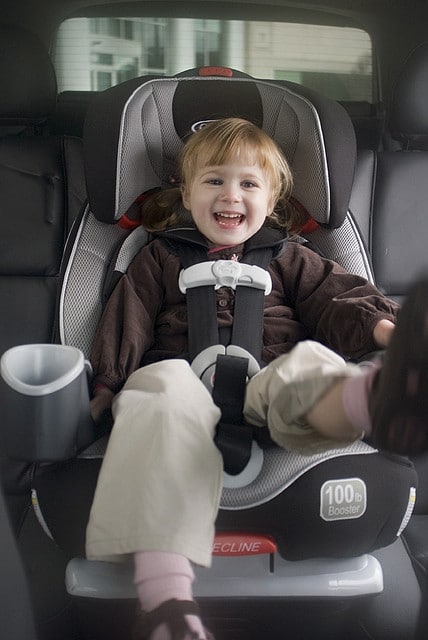Florida Child Seat Restraint Requirements Changing As Of January 1st
Protecting our children as they travel in the car from place to place is extremely important. That’s why there is so much attention being paid to properly restraining children in an appropriately sized car seat or booster seat.
Florida specifically requires that all drivers on Florida roads make sure that any child traveling in their vehicles use a crash-tested, federally approved car seat. For children up to three years old, this means that the child must be restrained in an infant carrier, a separate car seat, or an integrated child seat.
However, a recent amendment to Florida Statutes section 316.613 takes effect on January 1, 2015, requiring children who are 4 and 5 years old to be restrained in a separate carrier, an integrated child seat, or with a new option–a booster seat.
Booster Seats Reduce Dangers Created By Use Of Seatbelts On Younger Children

Currently, Florida is the only state that allows 4 year olds to use an adult seatbelt as a restraint when riding in a vehicle. However, the state’s new law, requiring the use of booster seats for older children, aims to reduce injuries to these older children, who are not well protected by a vehicle’s seatbelt when they sit in the vehicle’s passenger seats.
When a child is too short for a vehicle’s seatbelt or is only restrained by a lap belt that does not cover the chest area, the child is at risk of serious injuries if an accident occurs. Two types of injuries are particularly common:
- Head and/or neck injuries – often, when a child is too short to use a vehicle’s seat belt, the child will put his or her arm over the chest portion of the strap and pin the chest strap behind his or her back. This leaves the child only protected by the lap portion of the belt. If an accident happens when the child is only restrained by the lap portion of a seat belt, the child can be thrown forward, possibly hitting their head on the interior of the car (on objects such as the vehicle’s dashboard, front seat, console, door frame, or even the floor of the vehicle if the child is ejected). The head or neck injuries that result can include:
- brain trauma
- skull fractures
- spinal cord injury
- broken neck
- jaw fractures
- orbital fractures
- cuts and abrasions
- and more!
- Seatbelt Syndrome – a second common injury that occurs to children who use an adult seat belt without a booster seat is seatbelt syndrome (or SBS). Seatbelt syndrome describes the type of injuries that occur when a child’s body jackknifes over the lap belt during a front-end collision. The injuries occur when crash forces cause a child’s body to be propelled into the vehicle’s seat belt. The child’s body experiences tremendous force along the pelvis and mid-section of the body. This can lead to:
- severe abdominal injuries
- fractures of the lumbar spine
- serious closed head injuries
- facial injuries
- and more!
South Florida Lawyers Help Children Injured In Car Accidents
Proper use of a child safety seat can reduce fatal injuries of infants by over 70 percent and by 54 percent for children under 5 years old. For older children, booster seat use reduces the risk of serious injury by 45 percent.
That is why the personal injury attorneys at Hoffman, Larin & Agnetti, P.A. encourage all parents of young and older children to take a moment as the new year approaches to check the fit on your children’s car seats. If you have an older child, a booster seat may be the appropriate option.
If your child has been injured in a car accident by the negligence of another, we encourage you to contact our experienced Broward, Dade, and Monroe County child car accident victim attorneys so that we can work with you to obtain the maximum available financial recovery to help cover your child’s medical bills and other costs that follow a tragic accident. Call us today at 305-653-5555 or use our online contact form for immediate help.


